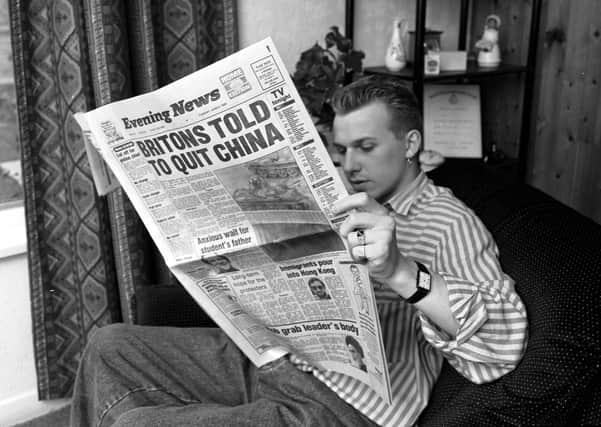Why you should support the trusted chroniclers of the Coronavirus Age – John McLellan


The first draft of history or tomorrow’s fish and chips, call it what you will, but in the social media age journalism is everywhere; people are publishing their take on the world as they find it at that moment and making their contribution to the record of the times.
Those comments, pictures and posts are molecules in the global organism that is social media, some get organised and evolve into something useful, but most are lost in the vastness of it all.
Advertisement
Hide AdAdvertisement
Hide AdNewspapers like the Evening News have been the only consistent record of the development of communities for over 200 years, the leather-bound copies of past editions a treasure trove of historical document. Small, seemingly trivial filler articles over time take their place in social history, each little detail a tiny facet of an era, each phrase a marker of attitudes.
Photograph from the 40s and 50s, printed with a grainy, hot-metal block, capture a fashion which died out, a shop no longer open, homes bulldozed and the faces of the elderly or the dead. Each page preserved for posterity and added to day after day.
You know this because you are reading this article. You too will have piles of old family photographs, maybe buried at the back of the sideboard all year, maybe never studied for years until something unexpected prompts their disinterment. Then the subjects come back to life, the days relived and fond memories rekindled because they mean so much to you. Maybe bad ones too.
But they mean less to anyone else because only you know the context which makes them relevant. They are a moment in time, but your time.
Advertisement
Hide AdAdvertisement
Hide AdThat’s the difference with newspapers; they capture a moment in the lives of whole communities, not just individual units; they attempt to explain, to put in context, to balance, to seek a wider audience.
The words are written to be understood quickly and clearly without being patronising, the pictures taken with consideration for composition and lighting, but above all they are selected.
These columns are just a snapshot of thought. Something seemingly vital one week might seem trite the next. So it is in the Coronavirus Age, except it’s not just one story or one situation but the understanding of our entire way of life which is changing and being challenged.
The internet is a blessing and a curse, potentially putting a resource which dwarfs the British Library not just into every home but the palm of every hand, but it’s so vast that mapping the way through the tangle of misinformation and rumour needs guidance, scouts who can find safe routes and get you to your destination, which are the recognised information services readers can trust.
Advertisement
Hide AdAdvertisement
Hide AdBut the very services which allow people to connect and delve are swallowing the scouts, and even though the companies which dominate the online world will see a significant profit slump in the short-term this won’t be permanent like for those organisations which provide them with their credibility.
Google and Facebook will suck up even more advertising because companies trying to find quick ways out the Great Corona Depression will take the easiest possible routes to revive their trade. As it stands, news organisations large and small will be lucky to survive this.
There are plenty people out there who don’t care – like the Conservative politician who suggested the Prime Minister might not have caught the virus had he not had to answer questions from journalists – but what would our communities be like without independent sources of information?
Information about local decisions made on your behalf would come from the council publicity team, news about Hearts and Hibs would be the preserve of the clubs and the voice of constructive dissent would be lost in the social media undergrowth.
Advertisement
Hide AdAdvertisement
Hide AdAnd that thread of social record which maintains continuity and a sense of community will be lost for ever.
Buy a newspaper.
Would you have banned Robert Capa from Omaha Beach?
Not everyone values a free Press, particularly those who reject the notion that the ability to be out reporting what’s going on is an essential part of whatever is left of our liberty in this crisis. Would they have objected to photographer Robert Capa being on Omaha Beach?
It is more crucial than ever that the powerful know the carte they have been handed is not blanche so for the avoidance of doubt, both governments recognise journalists’ right to continue reporting and yes, that does include exposing the ex-Chief Medical Officer’s hypocrisy. Whoever tipped off The Sun obviously agreed.
Councillors, like anyone, need exercise
After the ex-Chief Medical Officer’s little difficulty, there is high alert to see if any other PWSKB (people who should know better) are ignoring social distancing instructions. Like the public-spirited councillors who have been in touch with this newspaper asking what my colleague Councillor Mark Brown was doing in Portobello after he tweeted a picture of the beach.
He was out on his officially-permitted daily hour of exercise on his bike, as it happens… wistfully looking across the sea towards the East Neuk.
